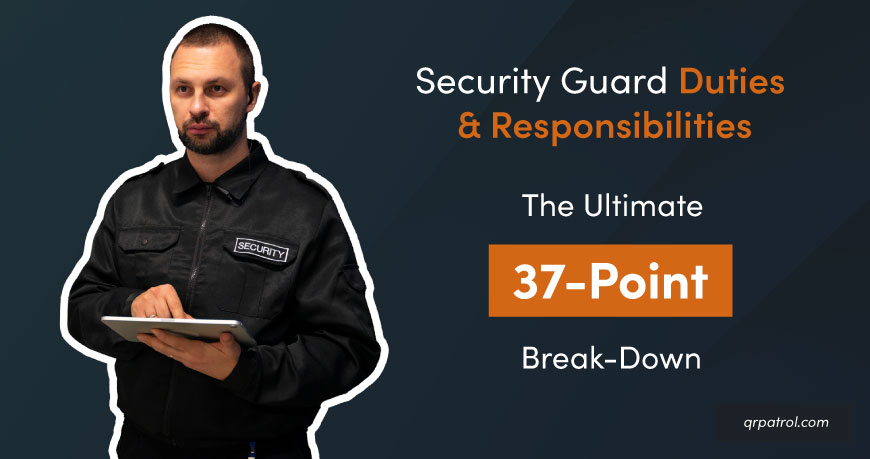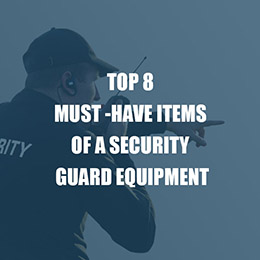- Posted by: atagkas
- Published: 20-05-2020
- Category: Security articles
Security Guard Duties & Responsibilites: The Ultimate 37-point break-down
Communities, whether small or large, primarily depend on trained security personnel to carry out essential security guard duties and responsibilities that protect their homes, businesses, and public offices.
They rely on security guards to patrol their property to deter criminal activity, lock and open secured gates, operate surveillance cameras, and perform various other tasks.
By fulfilling these security guard duties and responsibilities, security guards help maintain a safe and secure environment for the community, ensuring peace of mind for residents and business owners alike.
Security guards should be alert, vigilant, and possess exceptional analytical skills and stamina to perform in their job. While specific duties may differ from one security company to another, here are some common security officer duties that help to define the roles of security officers.
1. Securing the Premise
Security guards are frequently positioned as the first line of defense for businesses and homes against any illegal activity or external threat. Unlike police officers who deploy offensive tactics such as apprehending criminals or detaining assailants after an incident has occurred, security guards take preventative measures to deter crime and maintain safety for everyone.
Securing the property comes with several layers. These include:
- Patrolling the property: Security guard patrols make sure personnel and premises are safe by regularly making the rounds to prevent damage, burglary, and other unexpected occurrences. They assess on the spot if something looks out of place.
- Monitoring the premises: Security officers monitor and observe the environment they are protecting using monitoring equipment and building controls. If the situation calls for it, the officers can start investigating or call for additional help.
- Controlling access: They will control access for employees, visitors, and outside contractors and generally ensure that only authorized individuals gain access to office buildings, warehouses, event sites, and other assigned locations.
- Inspections: Security guards are usually responsible for inspecting buildings and ensuring that doors and access points are properly locked up and secured.
- Proper log management: From a security point of view, logs should serve as a red flag when something unusual is happening. Maintaining proper logs and reviewing them regularly could help identify malicious attacks on your security system.
2. Securing Personnel
Securing personnel is another major role of security officers. With the increased risks across the world, it has become more necessary for certain individuals to have personal security. The security guards partner with you or your family to create a plan customized to meet your safety and security goals. Besides personal protection, they provide security for your employees around and, on your premise, helping them become more productive in a secure and safe environment.
3. Protecting Assets
One of the most critical security guard job duties is safeguarding an organization's valuable assets. These assets could include physical property, intellectual property, financial resources, or sensitive data. Security guards ensure that company assets remain secure from theft, vandalism, or unauthorized access. Their presence alone acts as a deterrent to potential criminals, reducing the likelihood of asset loss.
To protect assets effectively, security guards often conduct routine inspections of the premises, verify inventory levels, and monitor security systems for anomalies. In industries such as retail, manufacturing, or banking, where the stakes are particularly high, their vigilance helps prevent both financial losses and reputational damage. For example, in retail settings, security personnel might patrol stockrooms, monitor customer areas for signs of shoplifting, and ensure employees adhere to security protocols. Similarly, in tech companies, guards may oversee data center access to protect sensitive information from breaches or sabotage.
Beyond theft prevention, security guards also safeguard assets during emergencies. For instance, during a fire or natural disaster, their quick thinking and adherence to protocols can save valuable equipment or documents from destruction. Their ability to act decisively under pressure ensures that businesses can recover swiftly with minimal setbacks, preserving their bottom line and operational continuity.
4. Observation and Reporting
Reporting is an important part of any guard's responsibilities. A security guard is expected to note their daily observations and report them in accordance with the established protocols. Usually, this will involve informing the manager, reporting to a supervisor, or calling the authorities or emergency services as warranted.
5. Incident Response
Security guards provide leadership and direction in emergencies and times of crisis. Whenever the security guards aren't equipped to handle certain situations, it's their duty to contact the concerned authorities at the earliest and ask for additional help. They are also tasked with reporting irregularities such as property damage, theft or any usual occurrence. They act as a knowledgeable resource and point of contact for the authorities in the event of a security situation.
QR-Patrol offers seamless monitoring, giving supervisors full visibility over guard tours and providing immediate alerts if any task is missed or delayed. This powerful tool not only enhances security but also boosts efficiency, as it eliminates the uncertainty of manual reporting.
By streamlining operations and increasing transparency, QR-Patrol empowers security guards to focus on what matters most—protecting people and property. Upgrade your security operations today with QR-Patrol and ensure that your team is always on task, always accountable, and always prepared.
6. Communication
Being a security guard requires more than just making rounds and making sure things are safe and clear. Communication is an integral part of the job. When it comes to safeguarding a building, personnel or valuable things, it will suit everyone's best interest if the security guards communicate effectively and efficiently at all times.
7. Damage Control
Security guards are also adept at assessing threats and suggesting solutions that help to protect people and places against possible risks. If employees are lax on some security protocol, security services can look into the matter and offer additional measures that can help avoid trouble. They should be able to anticipate events and act quickly to avert crises. Obviously, this will require a keen sense and focused mind.
8. Traffic Control
Additionally, they control traffic by ensuring that safety procedures are consistently maintained. They also investigate traffic accidents and give drivers assistance when necessary. They can also be used to cordon off specific areas.
9. Crowd Management
Security officers are often used in crowd control or supervising parking in major events be it a convention, a conference, or even a celebration event. They ensure that these places and events remain orderly and free from the chaos that can endanger lives or property.
10. Emergency Preparedness
Security guards must be trained in emergency preparedness, including fire drills, evacuation procedures, and first aid. For instance, a guard who identifies a fire hazard and acts promptly to evacuate occupants can prevent injuries and fatalities.
Similarly, guards who administer first aid to individuals in medical distress before paramedics arrive play a critical role in life-saving efforts. Additionally, their ability to coordinate with emergency responders ensures smoother crisis management and better outcomes for everyone involved.
11. Handling Suspicious Packages
Security guards are responsible for identifying and managing suspicious packages. They are trained to handle these situations without causing panic and to follow the proper protocols to address potential threats.
12. Verifying Identification
In environments where high-value assets or confidential information are at risk, this task becomes even more critical. Guards may utilize advanced tools such as electronic scanners, biometric devices, or security software to validate credentials accurately and efficiently. For example, in corporate settings, they may manage visitor logs and issue temporary access badges, ensuring that each individual entering the premises is accounted for and approved.
But security guard job duties are not only limited to physical checkpoints. Security guards often oversee digital access points, ensuring compliance with login protocols or securing remote server rooms. This dual approach of physical and digital access control helps organizations maintain a robust defense against internal and external threats.
13. Enforing rules and regulations
Security guards ensure compliance with the established rules and regulations of a facility or property. This might include dress codes, visitor policies, or adherence to safety standards.
14. Escorting Personnel
In situations where safety is a concern, security guards provide escort services to employees, visitors, or VIPs, ensuring their safe passage to and from designated locations.
15. Surveillance Monitoring
Security guards must be trained to recognize a wide range of behaviors that could indicate potential security threats. This includes detecting suspicious movements, unauthorized access, or any activity that deviates from the norm. Guards often rely on advanced technology such as CCTV cameras, motion detectors, and alarm systems, which help them monitor large areas efficiently
However, their success depends not only on the quality of the technology but also on their ability to interpret the information provided in real-time. A good security guard can discern between a harmless occurrence and something that requires further investigation or immediate action.
In addition to vigilance, security guards are expected to coordinate with law enforcement or emergency services when necessary. Once a threat is identified, swift action is required, whether it's sounding an alarm, notifying supervisors, or directly intervening.
Their ability to manage stressful situations effectively and maintain calm while ensuring safety is paramount. Regular training in emergency response protocols is vital, as it prepares guards to handle various scenarios, from minor disturbances to critical security breaches.
- Constant Vigilance: Ensure that all surveillance equipment is functioning properly and actively monitored.
- Detect Unusual Activity: Watch for any deviations from normal behavior, such as unauthorized entry, loitering, or suspicious movements.
- Assess the situation: Quickly evaluate the severity of the observed activity to determine whether it poses a threat.
- Immediate Response: Take prompt action by notifying appropriate personnel, sounding alarms, or contacting law enforcement if needed.
- Document Events: Record incidents, including time stamps, video footage, and details of the situation for later review or investigation.
- Coordination: Work closely with other security personnel and emergency services to address threats in a timely manner.
Ensure your security team stays on track with QR-Patrol! This innovative guard tour system offers real-time monitoring, automatic check-ins, and instant alerts to keep your officers accountable and efficient. Upgrade today and streamline your security operations!
16. Theft Prevention
Guarding against theft is a vital responsibility for security personnel, as preventing losses due to theft is crucial for protecting both assets and maintaining the integrity of a business or property.
Security guards are tasked with overseeing areas that are most vulnerable to pilfering, such as entry points, storage areas, or places where valuable items are stored. Through constant surveillance and awareness, they can spot any suspicious behaviors, such as individuals lingering in areas without a clear purpose or attempting to conceal items.
17. Parking Lot Management
Parking lot management is a significant aspect of security guard job duties, as these areas often serve as access points to larger facilities. Ensuring that parking areas remain organized and secure helps prevent disruptions, reduce liability risks, and maintain a safe environment for employees, visitors, and customers. Security guards monitor for unauthorized vehicles, ensuring compliance with parking regulations and preventing misuse of designated spaces such as those reserved for the disabled or VIPs.
18. Fire Watch Duties
During high-risk periods or in the absence of fire alarm systems, security guards perform fire watch duties, patrolling the property to ensure compliance with fire safety protocols.
19. Alarm System Management
An essential part of a security guard’s role is distinguishing between false alarms and real threats. False alarms can occur due to environmental factors, system malfunctions, or user error, and a quick, accurate assessment is necessary to avoid unnecessary panic or disruption.
However, when a genuine threat is detected, guards must act swiftly to mitigate risks, which may include notifying local law enforcement, securing the premises, or taking immediate action to address the emergency.
Security personnel must be trained to manage both situations with professionalism, ensuring that systems are reset after false alarms and that responses to legitimate threats are both efficient and effective.
20. Lost and Found Management
Security guards often manage lost and found departments, ensuring that misplaced items are logged and returned to their rightful owners.
21. Hazard Identification
Recognizing and addressing potential hazards before they become threats is a proactive duty of security guards. This includes identifying slippery floors, faulty wiring, or unstable structures.
22. Supporting Event Operations
From concerts and festivals to corporate gatherings and sporting events, security personnel help manage the logistics and flow of people to ensure everything runs as planned. One of their primary tasks is assisting with ticketing, checking attendee passes, and verifying credentials at entrances to ensure only authorized individuals gain access to specific areas. This helps to maintain security and prevent any potential security breaches before they occur.
In addition to ticketing, security guards are responsible for crowd control, ensuring that attendees move through the event spaces in an orderly manner. This includes directing large groups of people to designated areas, such as seating or stages, while also ensuring that bottlenecks or dangerous crowd congestion do not occur. Effective crowd management helps prevent accidents, such as stampedes or injuries, and ensures that attendees can enjoy the event in a safe environment.
QR-Patrol was the leading security guard tour management system to be used at the world cup in Qatar, helping to ensure the safety of athletes, workers and fans through this largescale event. The digital human activity remote management system was used in a wide range of buildings such as stadiums, hotels and training centres, essentially ensuring immediate intervention in the event of an incident.
- 'QR-Patrol' human resource management software was deployed in over 100 locations, including the Lusail National Stadium where the final was held.
- The system managed 150,000 events at points of interest, while being used by 1,100 people.
- The successful implementation of the leading Greek technological product in the World Cup paves the way for its full integration in world events of the same size.
23. Conducting Drills and Training
Regular training and drills conducted by security guards prepare all personnel for emergency situations, ensuring preparedness and reducing panic.
24. Conducting Security Assessments
Security guards perform regular assessments of the premises to identify vulnerabilities and recommend security improvements. Their expertise ensures businesses remain protected against emerging threats.
25. Patrolling Remote Areas
These areas are often less visible to the general public, making them prime targets for trespassers, vandals, or individuals involved in criminal activity. Security guards are tasked with regularly patrolling these areas to maintain a visible security presence and deter potential intruders.
Their presence can discourage illegal activities, such as theft, vandalism, or unauthorized entry, by signaling to potential wrongdoers that the area is being actively monitored.
During their patrols, security guards are trained to be observant, looking out for anything unusual that could indicate a security risk. This includes checking for signs of forced entry, damage to property, or suspicious behavior. They are also responsible for ensuring that gates, fences, and other security barriers are intact and functioning.
Regular patrols in remote areas help create a sense of security and reduce the likelihood of incidents going unnoticed.
For security guards and officers working in remote areas or on assignments where they are required to work alone, ensuring their safety is of utmost importance.
MyLoneWorkers system is an innovative lone worker app designed to be the ultimate tool for security professionals, offering a comprehensive range of features to monitor and protect workers in the field. With MyLoneWorkers, security officers can easily check in, trigger emergency alerts, and receive real-time monitoring, providing peace of mind for both the worker and their employer.
Whether you're patrolling isolated areas or handling sensitive situations, MyLoneWorkers is the essential safety solution that ensures every lone worker stays safe, connected, and supported.
26. Managing Access Control Systems
Security personnel are responsible for operating and managing advanced access control systems, ensuring that only authorized personnel can enter restricted zones.
27. Crowd Management During Emergencies
In times of crisis, panic can easily spread, and people may rush towards exits, creating confusion and chaos. Security guards are trained to manage such situations by staying calm, giving clear instructions, and directing individuals towards safe evacuation routes. By doing so, they help to prevent stampedes, bottlenecks, or accidents, ensuring that everyone can evacuate efficiently and safely.
28. Responding to Natural Disasters
In the event of natural disasters, security personnel assist with evacuation procedures and ensure the safety of individuals on-site.
29. Conflict Resolution
Security guards often mediate disputes or conflicts on the premises, de-escalating situations before they escalate into violence.
30. Training New Guards
Experienced security personnel mentor and train new recruits, ensuring they are familiar with the duties and responsibilities of security personnel.
31. Respond to Medical Emergencies
Many security guards are trained in basic first aid, including CPR, wound care, and how to recognize symptoms of medical conditions such as heart attacks or strokes. This training enables them to offer immediate support, potentially saving lives before medical professionals arrive.
Whether it's administering first aid to an injured person, assisting someone having a medical episode, or providing comfort in a crisis, security guards are prepared to act swiftly and confidently.
In addition to providing first aid, security guards play an important role in coordinating with emergency medical teams. They are often responsible for alerting paramedics, directing them to the location of the incident, and securing the area to ensure that medical personnel can work efficiently.
Their knowledge of the premises is vital in these situations, as they can guide emergency responders to the right location without delay. Furthermore, security guards are often required to document the event, which can be important for follow-up medical care or legal purposes.
32. Monitoring Weather Risks
Guards monitor weather conditions that might pose risks, such as storms or floods, and take proactive measures to minimize damage.
33. Documenting Evidence
Security personnel document incidents meticulously, ensuring accurate records are available for investigations or insurance claims.
34. Addressing Workplace Violence
In cases where violence does occur, security guards act swiftly to contain the incident, prioritizing the safety of all individuals involved. This might include escorting the aggressor away from the premises, administering first aid to injured parties, or coordinating with law enforcement and emergency responders. Their role in maintaining calm and providing clear instructions during such events is crucial in minimizing harm and restoring order.
35. Monitoring Environmental Safety
Guards ensure thatenvironmental safety protocols are followed , particularly in factories or labs handling hazardous substances.
36. Prepare and Submit Incident Reports
These reports document any unusual occurrences, accidents, or potential security threats, ensuring that a detailed and accurate record is available for future reference.
This documentation can be used for legal purposes, insurance claims, or internal investigations. By preparing and submitting incident reports, security guards provide a clear account of events that can help resolve disputes, track patterns of criminal activity, or assist in improving security protocols.
37. Maintain Security Equipment or Systems
Maintaining Security Equipment and/or Systems includes:
-Routine Inspections: Ensure all security equipment and systems, such as alarms, cameras, and access control systems, are regularly inspected for functionality. Regular checks help identify any malfunctions or issues before they compromise security.
-Preventive Maintenance: Implement a scheduled maintenance program to prevent equipment failure. This includes cleaning, updating software, and replacing worn-out components to keep systems operating at peak efficiency.
-Calibration and Testing: Regularly calibrate security systems like surveillance cameras, motion sensors, and alarms to ensure accurate performance. Test all systems to verify they respond as expected in different scenarios.
-Documentation of Issues: Maintain a log of all equipment repairs, malfunctions, and maintenance activities. This documentation helps track patterns of issues, so that recurring problems can be addressed proactively.
-Inventory Management: Keep an up-to-date inventory of all security equipment, including spare parts and tools, so that replacements and repairs can be quickly addressed.
-Upgrading Systems: Stay informed about advancements in security technology and consider periodic upgrades to systems for improved performance, such as adding enhanced surveillance cameras or upgrading alarm systems.
Being a security officer comes with a great deal of responsibility. That's why proper security training is so essential to ensure even the most simple responsibility isn't overlooked.
In conclusion, these essential security guard duties and responsibilities play a crucial role in ensuring safety, maintaining order, and preventing potential threats in any environment. From preparing and submitting detailed incident reports to maintaining security equipment and systems, security guards are vital in providing a secure and safe atmosphere























